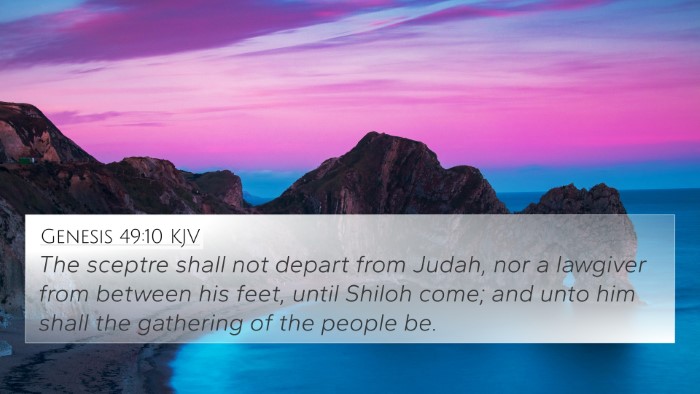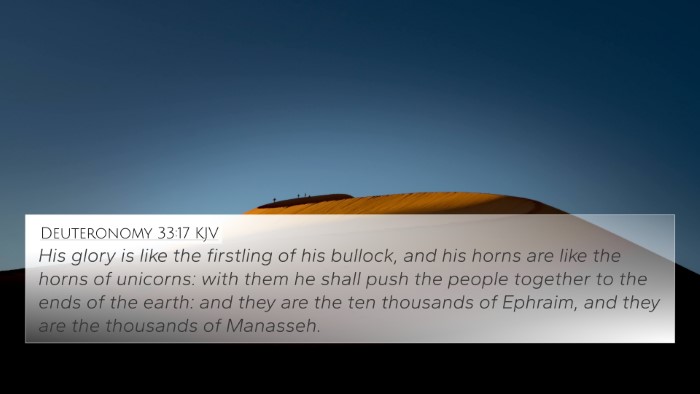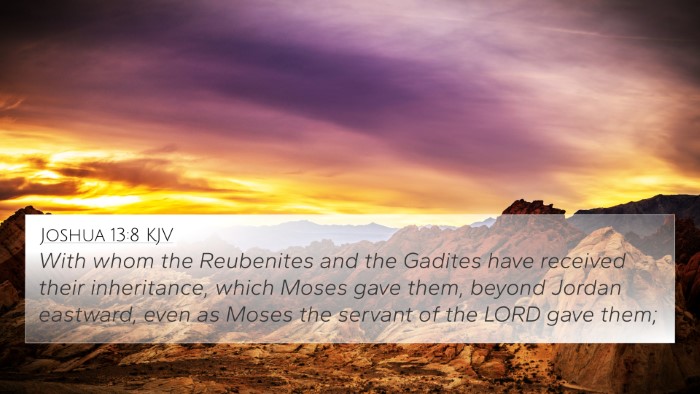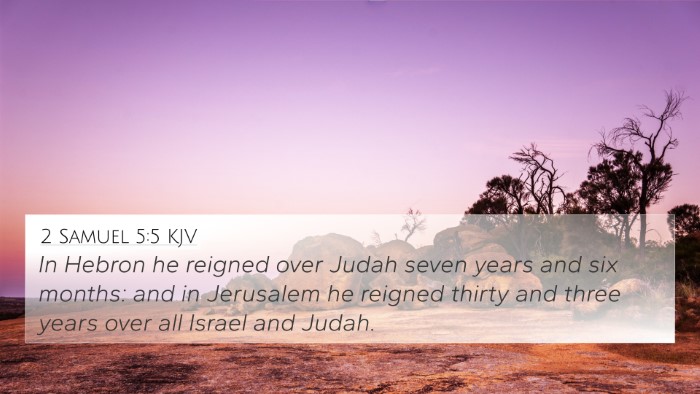Psalms 108:8 - Meaning and Interpretation
Psalms 108:8 reads: "Gilead is mine; Manasseh is mine; Ephraim also is the strength of my head; Judah is my lawgiver." This verse highlights the significance of various tribes of Israel in God's plan, each symbolizing different attributes and roles in the divine narrative.
Summary of Insights
This verse emphasizes God's claim over specific tribes, representing a divine ownership and purpose. The mention of Gilead, Manasseh, Ephraim, and Judah illustrates the broader theme of God's sovereignty and the unique characteristics He bestows upon each tribe. The insights from public domain commentaries such as Matthew Henry, Albert Barnes, and Adam Clarke help to enrich our understanding.
Commentary Insights
-
Matthew Henry:
Henry interprets this verse as an affirmation of God's possession over His people. The tribes mentioned each reflect certain strengths: Gilead represents strength,
Manasseh provides a double portion, Ephraim symbolizes might, and Judah stands for law and governance. Each aspect highlights the multifaceted nature of God's guidance and strength among His people.
-
Albert Barnes:
Barnes suggests that the enumeration of these tribes signifies their importance in the conflict ahead. These tribes correspond to the characteristics of leadership, authority, and protection.
The use of personal pronouns indicates that God takes active ownership of His chosen, promising support and strength through trials and warfare.
-
Adam Clarke:
Clarke emphasizes that this verse portrays the unity and distinct roles of the tribes in fulfilling God’s plan. The reference to strength and governance speaks to the divine order
through which God exercises power and delivers His people from their enemies.
Connecting Bible Verses
The following cross-references illustrate the interconnectedness of this verse within the broader Biblical narrative:
- Psalms 60:7 - "Gilead is mine; and Manasseh is mine; Ephraim also is the strength of mine head; Judah is my lawgiver;"
- Numbers 32:1-5 - Discusses the inheritance of the tribes, particularly Gilead and Manasseh's role.
- Joshua 15:1 - Describes the territorial allotments among the tribes.
- Genesis 49:8-12 - Prophetic blessings on Judah, connecting his lineage to kingship and law.
- Isaiah 11:13 - Discussing the banishment of Ephraim as a sign of conflict.
- Jeremiah 31:18-20 - Reflects on Israel's pride and God's comfort, linking Ephraim back to God’s mercy.
- Romans 11:16-18 - Paul referencing the remnant of Israel, emphasizing God’s continued plan through Israel.
- Hebrews 7:14 - Emphasizes Jesus' descent from Judah, reflecting the lawgiver's role.
- Matthew 1:2-3 - Highlights the genealogy of Jesus, connecting back to the significant tribes.
- Revelation 7:5-8 - The mention of each tribe in God’s salvific plan in the end times.
Thematic Connections
The verse establishes thematic connections related to God’s sovereignty, ownership over His people, and divine leadership through the tribes of Israel. Each tribe’s mentioned represents aspects of Israel’s identity and purpose in God’s plan for humanity.
Applications of Cross-Referencing
Engaging in cross-referencing opens avenues for deeper understanding of scripture, enhancing biblical study methods, and illuminating themes consistently present throughout the Bible. Here are tools and methods for effective Bible cross-referencing:
- Bible Cross-Reference Guide: A resource for connecting verses relevant to prayer, worship, and divine promises.
- Tools for Bible Cross-Referencing: Includes lexicons and concordances to trace parallels and themes.
- Bible Concordance: A comprehensive tool to locate specific words or phrases guiding through scripture.
- Cross-Referencing Bible Study Methods: Students can engage in thematic studies linking different books and passages.
- Identifying Connections Between Old and New Testament: Understanding how the Old Testament foreshadows the New Testament revelation.
Conclusion
Psalms 108:8 serves as a reminder of God’s ownership and the distinct roles of the tribes of Israel in His divine plan. Through analysis with classical commentaries and thematic connections, we can appreciate the cross-references within the Bible that enhance our understanding of scripture. This verse encapsulates significant truths about God's sovereignty, the characteristics of His people, and the fulfillment of His promises throughout human history.









